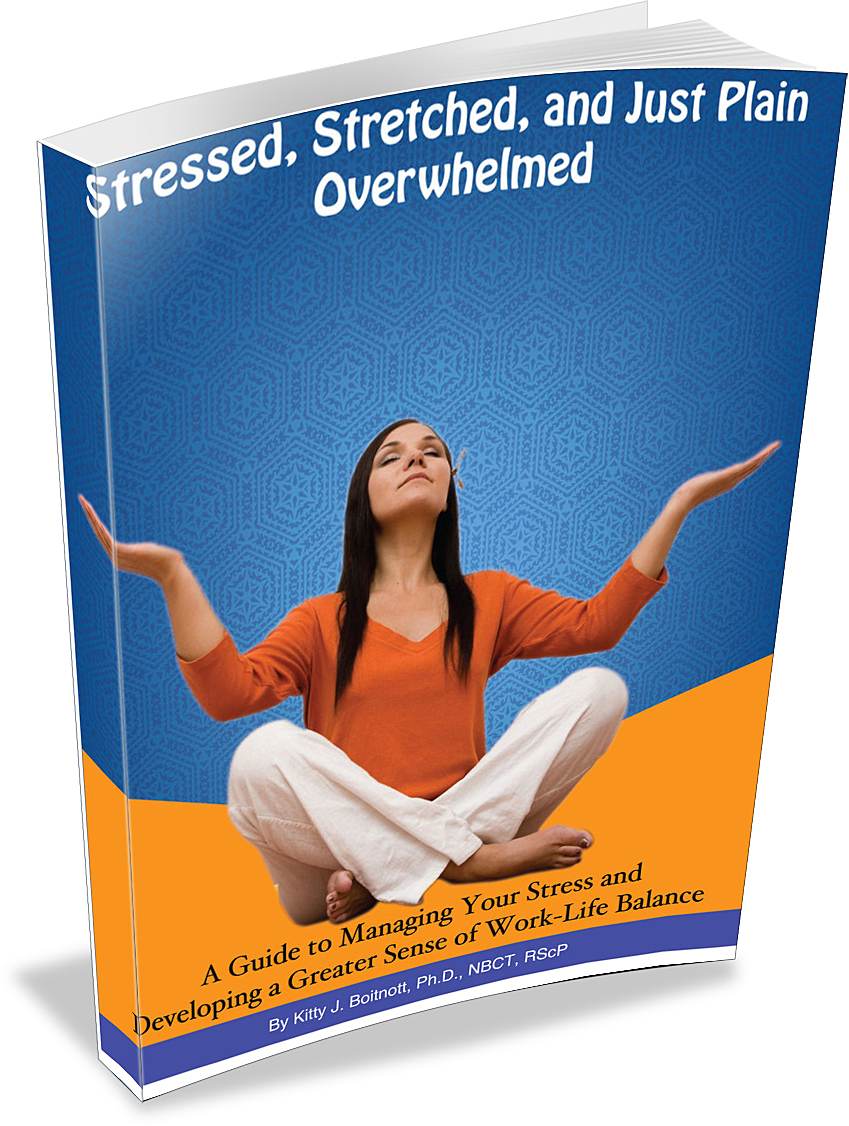|
Want Some More Stress Relief Strategies? 9 More Tips on How to Handle Everyday Stress Throughout the Year--Including the Holidays
Rev. Dr. Kitty Boitnott, NBCT, RScP
Heart-Centered Career Transition & Job Search Coach | Certified Stress Management Coach

Everyday stress can get you down. More importantly, perhaps, everyday stress can become chronic stress. The unrelenting nature of chronic stress grinds you down, which is why healthily dealing with stress is so critically important.
And for this week's message, I found some more stress-relieving tips that I hope you will find useful.
Let's face it. The holidays have a way of adding to our "everyday" stress.
Whether your stress is from "everyday" pressures at work or home or the added stress of the holidays, some of the suggestions below may be useful to you:
1. Take an art class. Research shows that art therapy helps to relieve stress. There is something therapeutic about being able to channel your internal emotions into an art medium.
It can be any medium: painting, sculpture, weaving, pottery, etc.
Self-expression can be very healing regardless of the form it takes. It's ironic that we tend to encourage our kids to express themselves through their art, but we forget that we can do that, too!
You can find art classes for adults in most communities. It's just a matter of checking around. (Google is your friend when you want to locate resources like this in your area.)
And if music is more your medium, don't neglect to play your favorite instrument or listen to your favorite music.
Music can be incredibly soothing.

2. Try coloring for adults. Coloring for adults has become something of a trend over the last couple of years. Studies show that coloring calms the mind and the spirit.
Beautiful mandalas are available in many coloring books for adults. Buy a pack of coloring pencils or pull out your kids' crayons, and de-stress by focusing on coloring the mandala. It is a relaxing way to spend some time when you aren't on the phone, checking email, or posting on Facebook which isn't always relaxing, now is it?
Consider them a gift from me to you.
You can find websites with stress-relieving images to click on for inspiration. And there are many other sources for guided imagery online and at your library.
You may also choose to see a professional who can guide you through the imagery or meditation.
Be gentle with yourself.

4. Cut yourself some slack. Don't engage in so much self-criticism. Adopt and repeat (often) a self-affirming mantra. Repeat your prayers to yourself. Go into meditation for a few moments each day. Do whatever you need to do to silence the "you're not good enough" voice in the back of your head.
The Buddhists call that negative voice in the back of your head the “monkey mind.” The term refers to feeling unsettled, restless, or confused as the result of self-doubting, self-defeating thoughts. Natalie Goldberg, a writer, and a Buddhist suggests that the "monkey mind" is the inner critic that we all have.
Believe it or not, even hugely successful people have that critical voice inside their heads! The most notable people in history doubted themselves at least occasionally. In their private moments, they also had that "you're not good enough" voice in their heads. What distinguishes them from the rest of the population is that they ignored their voices (because there is no silencing them) and took action in spite of their self-doubts.
It takes courage to discard the "monkey mind" and "do it anyway."
But we can each live more courageously if we choose to ignore our self-defeating thinking.
5. Learn to take a timeout. When you are stressed, you will be more prone to angry outbursts. Learn to take a moment for a timeout before responding to something that has angered you.
Unfortunately, irritability goes along with stress.
Our emotional fuses are much shorter when we are stressed out. Things that might not bother us on other occasions drive us bananas when we are stressed out. So take a moment before reacting to something that lights a fuse in you. You don't want to blow up, especially if you are at work. Losing your composure at work can do irreparable harm to your professional standing and reputation.
With that said, you don't get a free pass at home, either. Your family needs you to be in control of your emotions, including your temper. Something said in the heat of the moment can do more harm to those around you than you might want. Words spoken in anger are hard to retract. Words wound.
It takes practice and self-restraint to learn to control your emotions so that you respond instead of reacting in the heat of the moment.
But you owe it to yourself and those around you to work on it.
6. Be unavailable and go offline periodically. Sometimes it can be stressful to feel like you always have to be there for other people at the expense of taking time for yourself. At some point, it's essential to turn off your telephone(s) and close your email and be there for yourself for a change.
You can even choose a regular time to do this if that feels right for you. Just inform your friends and family in advance so they won't worry when you don't answer your phone or email.
7. Breathe deeply. I have spoken to the importance of breathing before. It cannot be over-emphasized. Learning to take slow, deep breaths can help relieve stress in moments when you need to relax a bit. Deep breathing helps remove toxins from your body and relax your muscles. It also calms the mind.
8. Don't set the stage. Without meaning to, you may be "setting the stage" for everyday stress. For example, if you don't maintain your car, it may break down "all of a sudden," making for a very stressful time. The same can be true of not taking care of your nutritional needs. There are endless ways that people find to sabotage themselves, thus "setting the stage" for additional stress in their lives. Examine where you may be doing that yourself. If you tend to do that, figure out ways to stop.
I also cannot stress enough the idea that neglecting your health can lead to your getting sick.
And getting sick definitely adds to stress, especially when trying to make up for the time lost after you get better.
9. Keep a healthy perspective. You can get overwhelmed with stress when everything seems vitally important. You can start to feel like everything must be done "right now."
Try to keep a healthy perspective on things. Remind yourself that a situation, decision, or "moment" may not matter at all ten years from now.
And remember the wisdom that popped up a while back? "Don't sweat the small stuff" became a part of the popular lexicon.
Stress, as I have noted before is an everyday fact of life. We will never rid ourselves of it, and if history is a predictor, chances are life will continue to get more complicated and more stressful. If we can't get rid of stress, then we have to learn to live with it.
The problem isn't the stress, however. The problem is our response to stress.

The solution to dealing with stress is to become intentional in the way you choose to respond to the stress in your life as opposed to the way you might be tempted to react to it.
When we are stressed, and we feel offended by something, we may be tempted to lash out. That reaction comes from the automatic response of the amygdala in your brain. That is the "lizard" brain that reacts at the moment without thinking about the consequences.
Sometimes the stress we experience is self-induced, unfortunately.
So, consider what you might be doing to contribute to an ongoing problem and what you might do to help decompress the problem.
If you haven't yet downloaded my free eBook, Stressed, Stretched, and Just Plain Overwhelmed, please feel free to download it now. It is full of other strategies for managing stress that I haven't mentioned in either this week's or last week's post.

I have also written about how stress impacts teachers in particular. I just wrote a blog post this week on stress and the holidays and how teachers are affected.
And if you are a teacher who is feeling particularly stressed, you may be interested in my 7-part mini-course on "Stress Management Tools for Teachers." It is available for only $97. Check it out below:

This 7-part program is designed to help the teacher who is feeling stressed out and overwhelmed take control of their situation using strategies to help them get through the holidays and the remaining school year with greater ease.
HERE IS WHAT YOU GET FROM THIS COURSE.
- Create a new mindset and a more positive attitude about work.
- Employ intentional, healthy habits to stay well and strong.
- Take control of your environment at work and home.
- Manage your workload more effectively.
- Use the 5-second rule by Mel Robbins.
- Set stronger boundaries.
- Know when to ask for help and don't be afraid to ask for help when you need it.

Want to learn more about the program before buying? Make an appointment to talk with me about whether or not the program is right for you. My calendar is at http://kittyboitnott.coachesconsole.com/calendar.
Until next time.
|